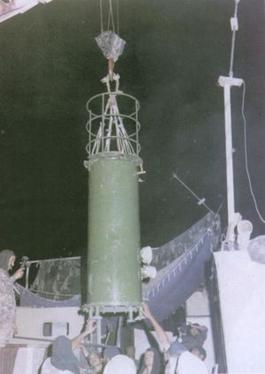
Pokhran-II
The Pokhran-II tests were a series of five nuclear bomb test explosions conducted by India at the Indian Army's Pokhran Test Range in May 1998.[3] It was the second instance of nuclear testing conducted by India; the first test, code-named Smiling Buddha, was conducted in May 1974.[4]
Pokhran-II
Operation Shakti
India
11–13 May 1998[2]
3 (5 devices fired)
Underground tests (underground, underground shaft)
45 kilotons of TNT (190 TJ) tested;[1]
Scale down of 200 kt model
The tests achieved their main objective of giving India the capability to build fission and thermonuclear weapons with yields up to 200 kilotons.[1] The then-Chairman of the Indian Atomic Energy Commission described each one of the explosions of Pokhran-II to be "equivalent to several tests carried out by other nuclear weapon states over decades".[5] Subsequently, India established computer simulation capability to predict the yields of nuclear explosives whose designs are related to the designs of explosives used in this test.[1]
Pokhran-II consisted of five detonations, the first of which was a fusion bomb while the remaining four were fission bombs.[3] The tests were initiated on 11 May 1998, under the assigned code name Operation Shakti, with the detonation of one fusion and two fission bombs.[3] On 13 May 1998, two additional fission devices were detonated,[6] and the Indian government led by Prime Minister Atal Bihari Vajpayee shortly convened a press conference to declare India as a full-fledged nuclear state.[6] The tests resulted in a variety of sanctions against India by a number of major countries including Japan and the United States.
Many names have been assigned to these tests; originally these were collectively called Operation Shakti–98, and the five nuclear bombs were designated Shakti-I through to Shakti-V. More recently, the operation as a whole has come to be known as Pokhran-II, and the 1974 explosion as Pokhran-I.[7]
Reactions to tests[edit]
Domestic reactions[edit]
News of the tests were greeted with jubilation and large-scale approval by society in India.[29] The Bombay Stock Exchange registered significant gains. Newspapers and television channels praised the government for its bold decision; editorials were full of praise for the country's leadership and advocated the development of an operational nuclear arsenal for the country's armed forces.[29] The Indian opposition, led by Indian National Congress criticised the Vajpayee administration for carrying out the series of nuclear tests. The INC spokesperson Salman Khursheed, accused the BJP of trying to use the tests for political ends rather than to enhance the country's national security.[29]
By the time India had conducted tests, the country had a total of $44bn in loans in 1998, from the IMF and the World Bank.[30] The industrial sectors of the Indian economy, such as the chemicals industry, were likely to be hurt by sanctions.[30] The Western consortium companies, which had invested heavily in India, especially in construction, computing and telecoms, were generally the ones who were harmed by the sanctions.[30] In 1998, Indian government announced that it had already allowed for some economic response and was willing to take the consequences.[30]
International reactions[edit]
Canada, Japan, and other countries[edit]
Strong criticism was drawn from Canada on India's actions and its High Commissioner.[31] Sanctions were also imposed by Japan on India and consisted of freezing all new loans and grants except for humanitarian aid to India.[32]
Some other nations also imposed sanctions on India, primarily in the form of suspension of foreign aid to India and government-to-government credit lines.[33] However, the United Kingdom, France, and Russia refrained from condemning India.[33]
China[edit]
On 12 May the Chinese Foreign Ministry stated: "The Chinese government is seriously concerned about the nuclear tests conducted by India," and that the tests "run counter to the current international trend and are not conducive to peace and stability in South Asia.".[34] The next day the Chinese Foreign Ministry issued the statement clearly stating that "it is shocked and strongly condemned" the Indian nuclear tests and called for the international community to "adopt a unified stand and strongly demand that India immediate stop development of nuclear weapons".[35] China further rejected India's stated rationale of needing nuclear capabilities to counter a Chinese threat as "totally unreasonable".[35] In a meeting with Masayoshi Takemura of Democratic Party of Japan, Foreign Minister of the People's Republic of China Qian Qichen was quoted as saying that India's nuclear tests were a "serious matter," particularly because they were conducted in light of the fact that more than 140 countries have signed the Comprehensive Test Ban Treaty. "It is even more unacceptable that India claims to have conducted the tests to counter what it called a "China threat".[35] On 24 November 1998, the Chinese Embassy, New Delhi issued a formal statement: